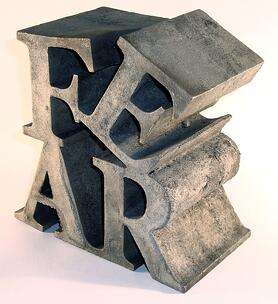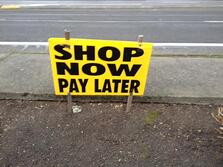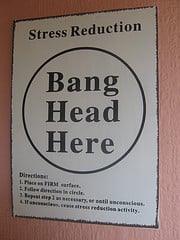You need to understand what a debt collector CAN and CANNOT DO!

Make no mistake, it is a scary time when someone knocks on your door and says something like, "Are you....You've been served!"
Sometimes, the delivery person is a police officer and that even makes it worse!
Someone has said that FEAR is:
- False
- Evidence, that
- Appears
- Real
So true! We often get "freaked-out" because we think something is what is not.
Let me try and help you get over the fear of receiving a summons!
I/we've been helping people with DEBT, basically UNSECURED DEBTS, for many years.
When you have too much debt to keep up with the payments due, they may be charged off by the original creditor or placed with a collection agency in an effort to collect on the delinquent debt.
If you've ever been in that situation, you know that you get letters and calls and calls and calls. By the way...hears how to put a stop to collection calls:
If the collector cannot get you to pay the debt, they may decide to FILE A COMPLAINT. This is a legal technique whereby an attorney, licensed in your state, is hired by the debt collector or creditor to file an official complaint with your county court.
Next, you will receive a SUMMONS. And this is when it gets scary!
We're located in Portland, Oregon and in the County of Multnomah. A client recently sent us a SUMMONS and this is what it said (you can understand why they were upset!):
"YOU ARE HEREBY required to appear and defend the complaint filed against you in the above-entitled action within thirty (30) days from the date of service of this summons to you. In case of your failure to do so, for want thereof, Plaintiff will apply to court for the relief demanded in the complaint."
"You must "appear" in this case or the other side will win automatically. To "appear" you must file with the court a legal paper called a "motion" or "answer". The"motion" or "answer" must be given to the court clerk or administrator within 30 days along with the required filing fee. It must be in the proper form and have proof of service on the Plaintiff's attorney or, if the Plaintiff does not have an attorney, proof of service on the Plaintiff. If you have any questions, you should see an attorney immediately."
WOW, NO WONDER PEOPLE GET SCARRED!!!
OK, let's calm down and look closely at the SUMMONS.
First, in the case of UNSECURED DEBTS (Credit cards, medical bills, personal loans, Store Cards, private student loans, etc.), the Plaintiff (this is the creditor or who you owe the money to) cannot:
- Put you in jail
- Take other belongings
- Cause you any harm, etc.
In fact, there are limits and protection for consumers by the Fair Debt Collection Practices Act that you should be aware of.
Next, the SUMMONS seems to say that you are going to have to GO TO COURT!
NO IT DOESN'T! (Remember, FEAR...False Evidence that Appears Real?)
If you don't believe you owe the DEBT=CLAIM, then you must file an "Answer", which not only costs (about $165 last I heard in Multnomah County) but it must be in the proper, legal format which may require an attorney to prepare...more costs!
BUT, since you owe the debt (not the time to talk about the outrageous fees and interest tacked on), then you won't be filing an ANSWER.
SO NOW WHAT???
You should contact the attorney for the Plaintiff (creditor) and try to work out a repayment plan.
If you are employed (receive W-2 income), then you are not going to have very much leverage at this point. But, you should be able to negotiate a reduced settlement (if you have a large sum of funds to offer) or a repayment plan of the entire debt balance.
If the Plaintiff is awarded a judgment (which most likely they will win), then they can file a WRIT OF GARNISHMENT and your employer would have no choice but to deduct 25% of your net income (most states) and send it to the Plaintiff until the entire balance is paid!
Think about that for a minute. Let's say that you usual bring home pay (after taxes are withheld) is $2,500/month. At 25%, that's an additional $625 per month that would be deducted, leaving you with only $1875 to pay bills! Ouch!
Remember when you ignored those letters and calls? Well, this is one of the results that can happen. It is always better to try and negotiate with the creditor or collection agency than let the account go to this.
If you are self employed, you may have a little more leverage in that your "salary" may be low enough (if you are using a good accountant) to be exempt from garnishment. To see what this exemption amount is, check with your state's attorney general's website.
In Oregon, go to: State of Oregon Garnishment Forms.
If you are retired and are living solely on Retirement or Social Security, then those funds are protected from Garnishment or even a Bank Levy.
If you are SELF EMPLOYED or RETIRED, or receiving only DISABILITY INCOME, you should be able to negotiate a pretty decent settlement at 50% or less of the balance.
We've prepared a very good booklet that will explain how Debt Settlement can work:
OK, I hope you are starting to understand that just because you receive a SUMMONS, you are still going to be OK, BUT YOU HAVE TO TAKE ACTION...AND I MEAN IMMEDIATELY!!!
If you are not sure you can deal with debt collectors or the attorney for the Plaintiff, we can help:
Photo credit: Kevin B3 at www.milwaukieemakerspace.org/2012/fear/














